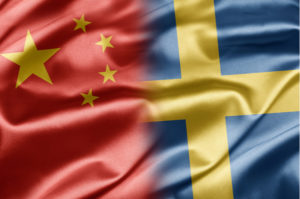Tiny remote Sweden, partially sitting in the polar region, is home to only a little over 10 million souls. China, meanwhile, is a massive country, home to nearly 1.4 billion. You may not think Sweden would have the wherewithal to defeat China in any theater of competition, but in one growing industry, Sweden is prepared to dominate its Chinese rival.
In the race for 5G technology leadership, Sweden’s Ericsson may be about to best China’s Huawei. Or, more accurately, Huawei’s ties to China’s Communist Party government are about to blow the technology company’s chances of a worldwide 5G expansion.
Stu Woo reports for the Wall Street Journal:
The Trump administration’s increasingly aggressive effort to cripple China’s Huawei Technologies Co. has presented Ericsson AB the opportunity to lead the rollout of 5G technology around the world.
The Swedish company is emerging as the steadiest player in the $80-billion-a-year cellular-equipment industry, telecommunications executives and analysts say, because it makes a technically advanced product that one rival, Nokia Corp., was late to develop and that Huawei may not be able to make in the future because of recent U.S. measures.
While its competitors try to recover, Ericsson is moving forward after a costly years-long restructuring has returned it to profitability. “The first step is for sure accomplished,” Chief Executive Börje Ekholm said. “The next step is to find longer-term growth for the company.”
The question for Ericsson is figuring out which technologies of tomorrow to bet on. Ericsson is testing equipment in several fields that 5G’s superfast wireless speeds promise to unlock, such as driverless cars and remote-control mining machinery.
Washington is lobbying foreign countries to ban Huawei, saying Beijing could direct the company to spy on or sabotage communications.
I have followed Ericsson on and off for decades. I wrote in late 2011:
Sweden is a global telecommunications giant. EWD owns shares of Ericsson and TeliaSonera, both telecom powerhouses in their own right. Ericsson’s networks are the conduit for 40% of the world’s mobile traffic, serving over two billion subscriptions. Ericsson has built a technology portfolio of over 27,000 patents.
Today Ericsson has the largest portfolio of patents in the industry, with 54,000 granted patents. It is a global 5G competitor with or without sanctions on Huawei. But with the U.S. campaign against Huawei, Ericsson is set for much easier expansion.
I’m not suggesting you invest in Ericsson today, but I am suggesting that you pay attention to the geopolitical risks an investment in a company like Huawei might produce. Companies wrapped up in the affairs of their country’s government are often affected by the political dramas surrounding them. That’s why, in this case, Ericsson, from tiny, mostly neutral Sweden, can compete with Huawei, which hails from the world’s most populous and second-largest economy.
At Richard C. Young & Co., Ltd., my family-run investment counseling firm, preference is given to investments in companies from countries with free markets and governments that help business by getting out of the way, not by trying to control it.
If you would like to learn more about our investment philosophy, please sign up for our monthly client letter by clicking here or schedule a free no-obligation appointment with an investment specialist by clicking here. We look forward to speaking with you.
If you’re willing to fight for Main Street America, click here to sign up for my free weekly email.





